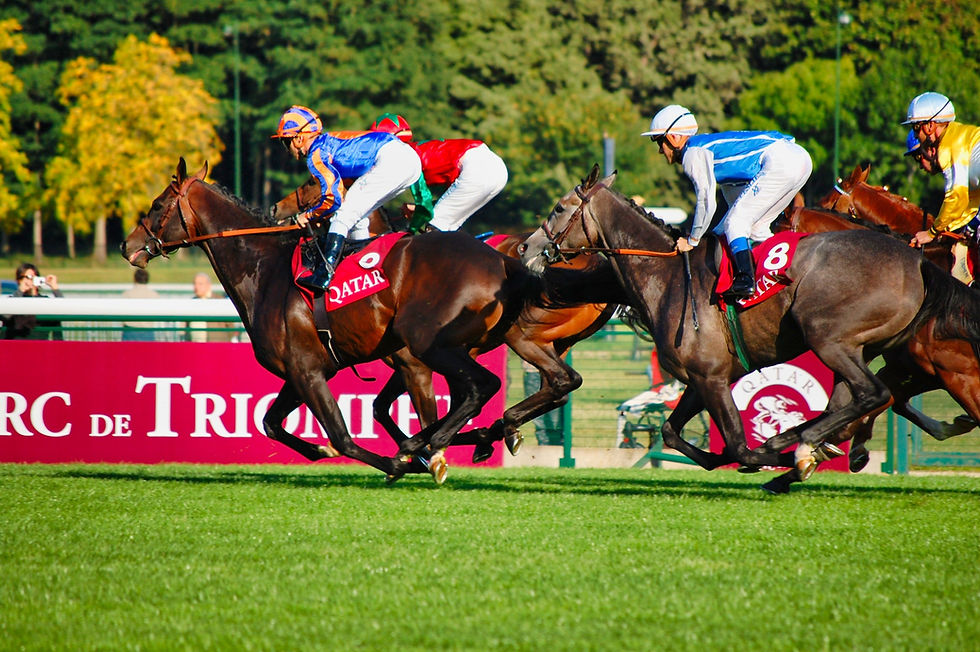Prix Royal-Oak - History and Trends
- Adam Mills

- Oct 24, 2023
- 3 min read

Prix Royal-Oak
The last Group 1 of the French Flat season will take place at Paris Longchamp this weekend. The Prix Royal-Oak has occupied this position in the racing calendar since the late 1970s and as a result it can be slightly forgotten, with the more significant races at the Arc meeting at the start of the month eclipsing it. Whilst that may be a little unfair, as we will see from the recent trends later on, this race has become a specialist event and it tends to be won by horses who are specifically aimed at the race, rather than those who arrive here as an afterthought.
Race History
Founded in 1861, the race was renamed after Royal Oak in 1869, who was a crucial stallion in the early establishment of French thoroughbred racing from the 1820s. In its earliest form, the race was restricted to 3-year-olds and was modelled on the English St Leger, although it was subsequently opened up to the older horses in 1979, with geldings allowed to run from 1986. When I was conducting my research for this piece, I found several comments that the change to the race terms that allowed the older horses to run was a mistake and that it had greatly weakened the race. I’m not sure that is entirely true, and I think it is probably a better reflection of the comparisons made between the Prix Royal Oak and the other middle distance contests run at Longchamp earlier in the month. Before the changes made in the 1970s and 1980s, the race had been won by some very notable 3-year-olds. Gladiateur (1865) had won the English Triple Crown before in the same season, Ksar (1921) was a dual Arc winner, whilst in the early 1960s it was won by the Derby winner Relko (1963) and the Prix du Jockey Club winner Reliance (1965).
In more recent times, the winners of this race have perhaps had a greater impact as stallions in the National Hunt sphere, with the likes of Turgeon (1991), Westerner (2003, 2004) and Aiden O’Brien’s great stayer, Yeats (2008) all having wins in this race on their CV. Perhaps its most successful winner this century would be Vazirabad for Alain Royer-Dupre (2015, 2016) who went on to win 3 Dubai Gold Cups. As well as Westerner and Vazirabad, there have been 2 other horses to win successive renewals of this race: Amilynx (1999, 2000) and Tac De Boistron (2013, 2014).
Jockeys and Trainers
Freddy Head rode the highest number of winners in this race with 6 victories between 1969 and 1989. Whilst Andre Fabre (1988-2011) and Francois Mathet (1959-1976) share the record number of Prix Royal Oak winners trained with 7 each. Of those still riding, Olivier Peslier leads the way with 3 wins (1999, 2000 and 2006) whilst Ryan Moore, Gerald Mosse, Christophe Soumillon and Martin Harley each have 2.
Recent Trends
Since the turn of the century, there have been eight 3-year-old winners of this contest, including 5 of the last 8. Eleven of the twenty-three races run during that time have been won by French trained runners, with the other twelve races split 10-2 between the British and Irish trained raiders. The Prix Chaudenay has proved to be the key piece of form for this contest, with Vazirabad (2015), Ice Breeze (2017) and Technician (2018) all completing the double. The race conditions mean that the 3-year-olds get 3.5-kilos from their elders (7lbs), which on heavy ground at the end of October can be quite an advantage. However, at the time of writing there are only 3 of them amongst the entries, Harbour Wind (Dermot Weld), Double Major (Christophe Ferland) and Rue Boissonade (Mikel Delzangles) and given that the latter ran at Ascot last weekend that may well be down to a maximum of 2 by the time we have the final declarations. Last year’s winner Iresine has not been entered this time around.
Whilst there isn’t an Antepost market to look at, there is perhaps an angle into the 2023 renewal if the 3-year-olds do take up their entries. Double Major and Harbour Wind finish 1,2 in the Prix Chaudenay on the Saturday of the Arc meeting and given the recent record of the horses coming here from that race, I’d be keen to explore that angle if they both line up on Sunday.




Comments